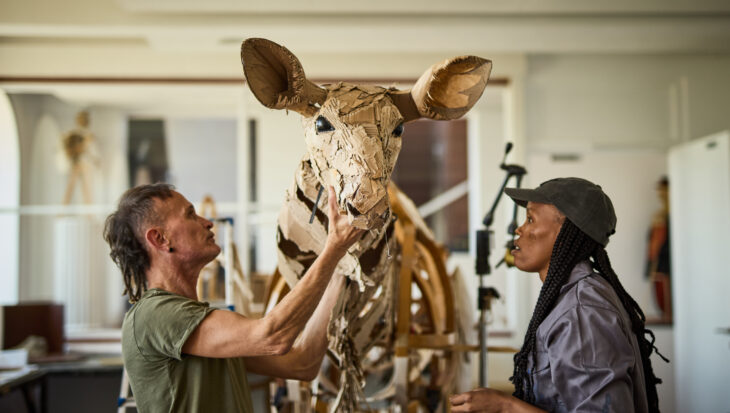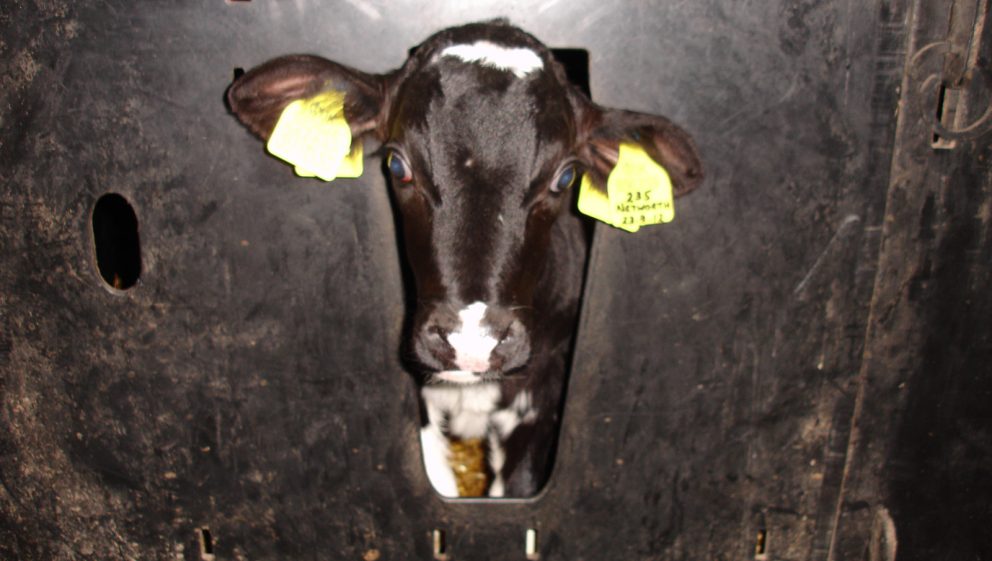‘The Herds’ will be arriving in London this Friday!
Have you heard? A breathtaking arts initiative, ‘The Herds’ will be arriving in London this Friday.
Posted 27 Jun 2025

Posted on the 2nd October 2012
Five animal farms celebrated during the past three years as meeting the industry’s highest possible standards are exposed in a shocking new Animal Aid undercover investigation.

Secretly-shot footage shows dead and dying chickens packed into massive sheds; diseased pigs barely able to walk; crowded, filthy pens; and cows kept all-year-round in barren ‘zero-grazing’ units.
The revelations come in the week that Park Lane’s Grosvenor House Hotel in London hosts the annual Farmer of the Year Awards (FoTY). The five farms investigated by Animal Aid were all shortlisted for, or won, a FoTY award between 2010-2012. They are located in Bedfordshire, Essex, Somerset, Northumberland and Dumfries & Galloway.
Farmers Weekly (FW), the event organiser, says that the awards ‘showcase the best farmers in the country by telling their stories. They aim to spread best practice, inspire others and influence the public about the role that farmers play in today’s society.’
Just one of the 15 judges for the 2012 awards profiled on the FW website made any mention of animal welfare. Instead, the focus is on ‘efficiency’ and ‘profitability’.
Past Animal Aid on-farm investigations exposing high levels of squalor, neglect and disease have usually been dismissed by industry spokespeople as unrepresentative ‘bad-apples’. The same, clearly, cannot be said of the subjects of the new exposé. Following on from several years of investigations into a wide range of different animal farms, Animal Aid is convinced that these industry-commended establishments point to a ‘race to the bottom’, with animal welfare counting for near zero against the drive for profits.
Said Animal Aid Campaigner and report author Ben Martin:
‘Many people want to believe that, as long as animals have a good life and a humane death, it is acceptable to eat their flesh, eggs and milk. But if the very “best farmers in the country” are unable to meet this basic test, what hope is there for animals reared on the thousands of farms that don’t win prizes?’
A summary of what was found at the five farms is set out below.
Twinwood Pig Unit, Bedfordshire: keeps 1,100 breeding sows; supplies Tesco and Sainsbury’s, and is accredited under the Assured British Pigs Red Tractor scheme.
Numerous examples of disease and infection were found including lameness, anal prolapse, pneumonia, lesions and tail infections. Some injured or sick pigs, though isolated, were still forced to walk, lay and sleep on bare, slatted floors. Many of the pigs also seemed to have clipped tails, which is a possible cause of many of the infections. Two dead pigs were dumped outside one of the sheds, covered with a plastic sheet. A third was found in a pen with four other live animals.
F J Bosworth & Sons, Essex: keeps 270 sows; and is accredited under the Assured British Pigs Red Tractor scheme. It sells ‘finished’ pigs to Cheale Meats, which had two of its slaughtermen jailed for animal cruelty in April, as a result of an Animal Aid investigation.
Sows who had recently given birth were confined to farrowing crates, which prevented them from walking or turning around. One sow appeared to have her front leg trapped in the bars of a crate. A bottle of antibiotics with a dirty needle stuck in the top and a pair of clippers of the type often used to remove the tails of piglets were also found. Some pigs were forced to live in pens covered in a thick layer of excrement, despite the farmer’s claims of high hygiene standards.
Steanbow Farms, Somerset: keeps 500 Holstein cows; supplies milk to Sainsbury’s; also raises 2.4m broiler chickens per year; and is accredited under the Assured Chicken Production Red Tractor scheme.
Conditions in the massive chicken sheds were extremely crowded, with chickens crammed in wing-to-wing. Some had difficulty walking and a number of dead and dying birds were also found inside the shed. Outside was a bin full of dead birds. Filming in the cowsheds proved impossible.
Sunny Hill Free Range Eggs, Northumberland: keeps 57,000 ‘free range’ chickens; supplies Tesco, Morrisons and ASDA. It is accredited under the Freedom Foods and Lion Code schemes.
The chickens were tightly packed into their housing units. With no perches provided, hens had to perch on food trays, machinery and water hoses. The floor of the sheds was a metal mesh that allowed droppings to fall through, and a huge pile of faecal matter could be seen underneath. This encouraged flies to breed. A large number were seen flying around the sheds and covering the floor of an adjoining office.
Rerrick Park Farm, Dumfries & Galloway: keeps 600 Holstein cows in a zero-grazing regime; and supplies the Co-op through Wiseman Dairies.
The adult cows were housed in a barren unit. It contained cubicles with just a thin layer of sand on the floor, which the cows slept on. The farmer has indicated that the cows are inside most of the time, with ‘a portion’ going out during the summer.
In another area were calves, some of whom had been separated from their mothers into small black crates. One was found dead, his mother staring at his body through the bars of her pen.
Have you heard? A breathtaking arts initiative, ‘The Herds’ will be arriving in London this Friday.
Posted 27 Jun 2025

As the greyhound racing industry releases its annual data on the number of dogs’ deaths, a raft of well-known names - alongside their canine friends - has called upon the Government to end greyhound racing....
Posted 26 Jun 2025
